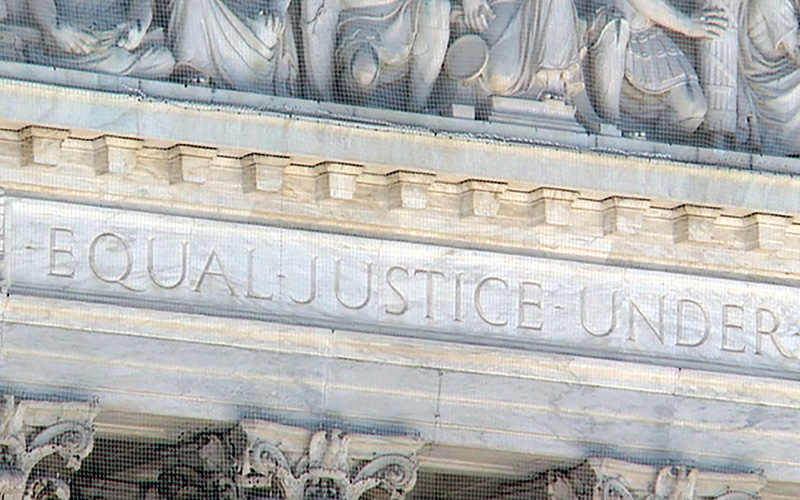- Slug: BC-CNS-Youth Sentences,690
- Sidebar: The defendants and their crimes
- Photo, video story available (thumbnail, caption below)
By AIDA CHAVEZ
Cronkite News
WASHINGTON – The Supreme Court on Monday ordered Arizona courts to reconsider the life-without-parole sentences handed down to five juveniles who were convicted in separate cases on a total of nine murders and other crimes in the 1990s.
The court vacated the sentences without hearing and ordered the Arizona Court of Appeals to consider whether the defendants were among “those rare children whose crimes reflect irreparable corruption” meriting life behind bars, or whether the crimes reflected their “transient immaturity.”
Justices Samuel Alito and Clarence Thomas disagreed, in a dissent by Alito that said the sentencing courts already made that calculation, and it’s not clear why the high court “is insisting on a do-over, or why it expects the results to be any different the second time around.”
All five cases were from Maricopa County, according to court documents. Maricopa County Attorney Bill Montgomery said in a statement provided by his office Monday that the office will review each case to determine how best to move forward.
“The balance we must strike in each of these cases is the requirement to comply with the Supreme Court’s ruling, the due process rights of each defendant, and the rights to justice and due process of each victim,” Montgomery’s statement said.
The defendants were either 16 or 17 years old when they committed the crimes that landed them behind bars for life without parole.
Bobby Purcell fired a sawed-off shotgun into a crowd, thinking someone flashed a rival gang sign, killing two and earning nine counts of attempted murder in 1998, according to court documents. William Najar was convicted of first-degree murder and other charges in 1998, and Jonathan Arias was convicted of two counts of first-degree and two counts of second-degree murder in 1999.
Bobby Jerry Tatum was convicted on one count of first-degree murder in 1994, the same year Scott DeShaw was convicted of murder.
At sentencing, judges in all five cases cited the age of the defendants as a mitigating factor, but went on to sentence them to life without parole.
Justice Sonia Sotomayor, writing in Tatum’s case, said previous Supreme Court rulings have held that minors are “constitutionally different from adults” in light of their “lack of maturity and underdeveloped sense of responsibility, their susceptibility to negative influences and outside pressure, and their less well-formed character traits.”
It was not enough that lower courts consider the defendants’ ages, Sotomayor wrote. She said they failed to consider “whether the petitioner was among the very ‘rarest of juvenile offenders, those whose reflect permanent incorrigibility.’”
She cited Najar’s case as one where the sentencing judge identified the defendant’s age and emotional immaturity as mitigating factors but did not evaluate whether he was a “rare juvenile offender who exhibits such irretrievable depravity that rehabilitation is impossible and life without parole is justified.”
Sending the cases back gives the lower courts a chance “to consider whether these petitioners’ sentences comply with the substantial rule governing the imposition of life without parole on a juvenile offender.”
But Alito countered that the lower courts had already done so and had concluded that the sentence was deserved.
He noted that Supreme Court rulings have prohibited mandatory sentences of life without parole when juvenile defendants are involved, but that was not the case here. He called the lower courts’ “eminently reasonable” rulings consistent with Supreme Court decisions.
“A sentence of life without parole was imposed in each of these cases,” Alito wrote. “Not because Arizona law dictated such a sentence, but because a court, after taking the defendant’s youth into account, found that life without parole was appropriate in light of the nature of the offense and the offender.”
Alito said the high court’s ruling earlier this year in Montgomery v. Louisiana – making the ban on mandatory life without parole for juveniles retroactive – would have no effect on the Arizona cases.
“The court grants this relief so that the Arizona courts can reconsider their decisions in light of Montgomery v. Louisiana … which we decided last term,” Alito wrote. “I expect that the Arizona courts will be as puzzled by this directive as I am.”
^__=
Web links:
_ Supreme Court order: https://www.supremecourt.gov/orders/courtorders/103116zor_d18f.pdf
_ Montgomery v. Louisiana: https://www.supremecourt.gov/opinions/15pdf/14-280_3204.pdf
^__=
SIDEBAR:
Youth is serving
The Supreme Court Monday ordered Arizona courts to reconsider life without parole sentences to give inmates who were all in their teens when convicted of these crimes:
– Jonathan Arias (March 1999): Two counts of first-degree murder; two counts second-degree murder; one count of conspiracy to commit murder; two counts of kidnapping; one count of burglary; four counts of armed robbery; one count, conspiracy to commit armed robbery.
– Scott DeShaw (July 1994): One count of first-degree murder, one count of kidnapping, one count of armed robbery.
– William Najar (June 1998): One count of first-degree murder; one count of first-degree burglary; two counts of theft.
– Bobby Purcell (June 1998): Two counts of first-degree murder; nine counts of attempted first-degree murder; one count of aggravated assault; one count of misconduct involving weapons.
– Bobby Jerry Tatum (May 1994): One count of first-degree murder; one count of aggravated assault; one count of attempt to commit armed robbery; one count of conspiracy to commit armed robbery.
^__=
The Supreme Court said Arizona courts need to reconsider life without parole sentences for five inmates who were still teens when they committed their crimes, to determine if the crimes were the result of “transient immaturity” or the work of “those rare children” who are truly incorrigible. (Photo by Nathan O’Neal/Cronkite News)
